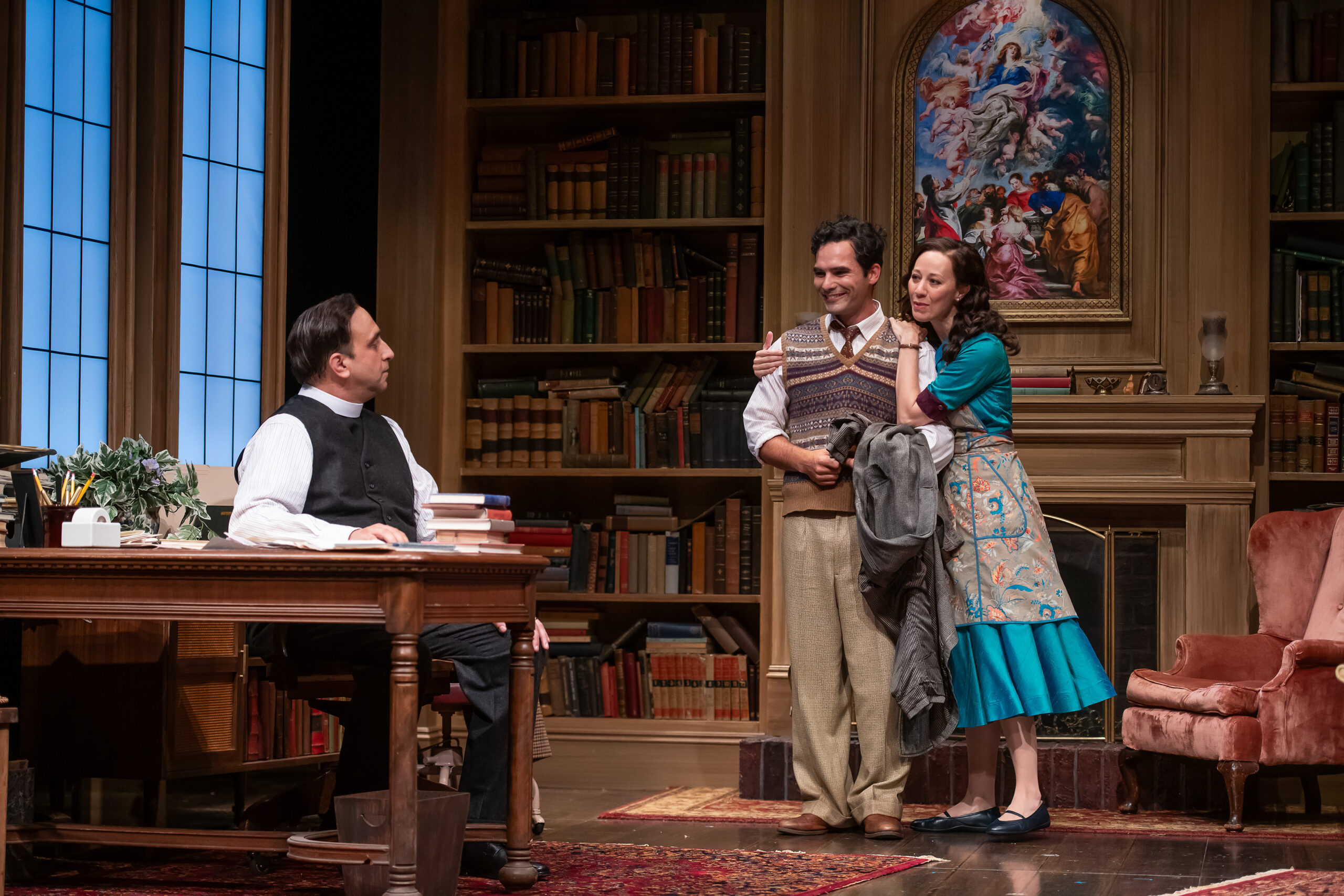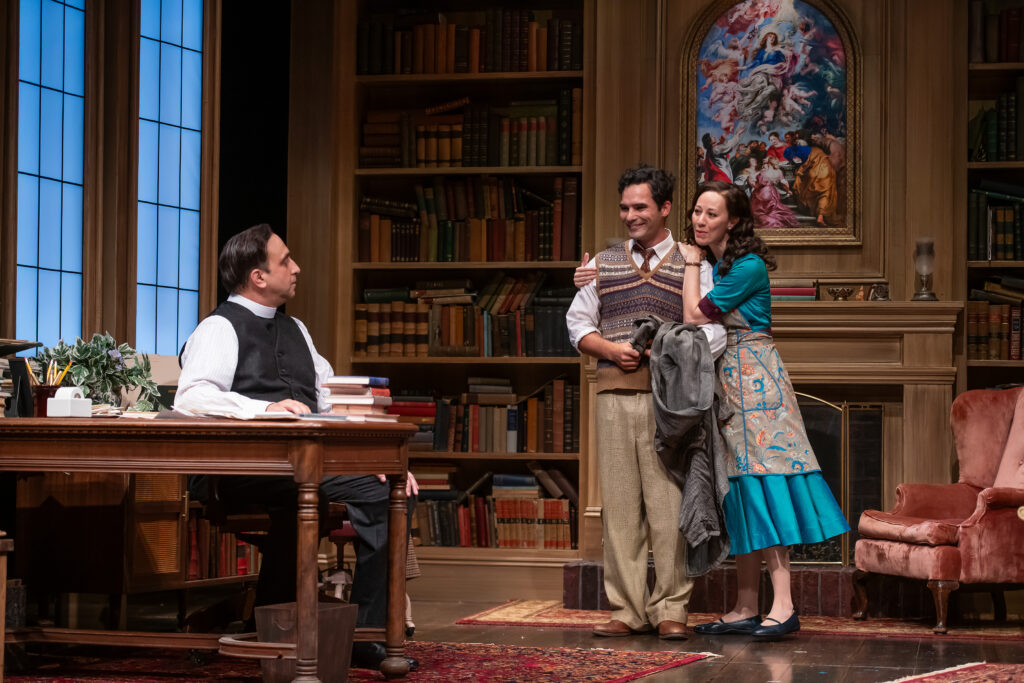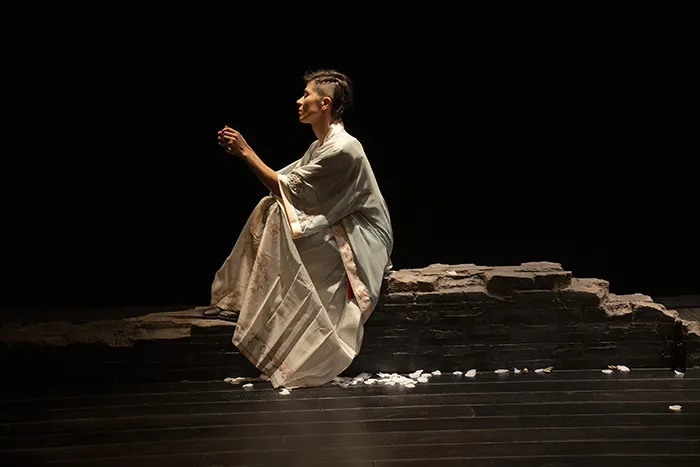
The late summer openings included the only Shaw play at the festival and an updated ancient Chinese classic from the Yuan dynasty.

Candida by George Bernard Shaw, directed by Severn Thompson, Royal George Theatre, closes Oct. 11.
I’ve always thought that Candida was a difficult play for men because of the ending and I still hold to that opinion.
Apparently, when the play premiered in 1904, it caused a sensation with audiences divided in their reactions. Inspired by Ibsen, Shaw’s aim was to infuse the well-made play with serious ideas. Until then, Shaw considered the well-made play to be the home of trite conventions.
Director Severn Thompson has updated Candida to the 1950s where a woman’s place is still the home and marriage ,but unlike IIbsen’s Nora who walks out, Shaw’s Candida stays put while having the upper hand.
Shaw’s premise is an interesting one. Candida comes from a rich family, but she and her husband are idealists, much to the disgust of her father. She has chosen to marry an Anglican clergymen who is a Christian socialist and who has become famous by devoting himself to raising the lives of the poor, in truth, mostly through the endeavours of Candida. Designer Michelle Tracey’s set evokes the rather thread-worn rectory of Saint Dominic’s Anglican Church,as does Ming Wong’s less than fashionable costumes.
Rev. James Mavor Morell sees Candida as a wonderful and devoted wife and mother who shares his passionate interest in the poor and who is beloved by the congregation for the loyal human being that she is. Into their lives comes the aristocratic poet, Eugene Marchbanks, who sees Candida as a goddess, a jewel surrounded by dross, who wants to take her away from this paltry life. And so the beguiling Candida is caught between two men who, quite frankly, she sees as boys when they begin to fight over her.
Shaw has infused the play with a literal whirlpool of ideas about love and marriage as each man presents his position and Candida counters with hers. She is certainly tempted by Marchbanks, that is for certain. What woman wouldn’t want to be worshipped when her husband is so prosaic? The choice Candida makes is to stay with the one who needs her most. You think it would be the poet, but it is her husband, and that is the shock, because he is the weakest in her eyes. How many men find that a devastating indictment of themselves?
Sochi Fried is not only one of the great actors at the Shaw Festival, (think of her radiant Orinthia in The Apple Cart last season), she is simply one of the great actors in the country, .and her Candida is a siren on steroids.. Her character is a captivating enchantress without her even realizing it, and that is the utter charm of her performance. Fried is perfection.
Sanjay Talwar as Rev, James Mavor Morell is earnest, committed, dedicated and even admirable, and one can see why Candida believed in his selfless mission. However, as the play progresses, we do begin to see cracks in James’s character and Talwar does an excellent job in portraying his weaknesses.
At the other end of the scale is the passionate, amorous, dreamy, sentimental Eugene Marshbanks who shudders at the thought of Candida doing dishes. He is just what we think an uber romantic poet should be. Marchbanks has the charisma of a Lord Byron which makes him irresistible, and Sousa plays him like a force of nature.
Drector Thompson has ensured that the three protagonist are at the top of their game at portraying their characters and there is a real symbiosis between them.
Ric Reid does a crusty turn presenting the subversive views of the rich capitalist Mr. Burgess, Candida’s father. Damien Atkins, who is usually such a good actor seems to be pretending to be the fussy insipid curate Rev. Lexy Mill rather than investing himself in the character. He is quite disappointing.
And in the adage that the show must go on, both Claire Julilan and her understudy Gabriella Sundar Singh were ill, so the role of Miss Poserpine Garnett, Morell’s obsessively smitten secretary, was played by bigwig Shaw actor Marla McLean, who never had been in the play, and with just one run through in the morning, and with script in hand, saved the show.
And a final takeaway. Amid some very fine performances, you simply couldn’t take your eyes off Fried. Her incandescent Candida is.the glue that holds the show together.

Snow in Midsummer by Frances Ya-Chu Cowhig, based on the classical Chinese drama The Injustice to Dou E that Moved Heaven and Earth by Guan Hanqing, Jackie Maxwell Studio Theatre, closes Oct. 5.
This 2017 play is part of the Royal Shakespeare Company’s Chinese Translations Project, a cultural exchange designed to bring Chinese classical drama to a new audience. 45 plays written between the 14th and 16th centuries, considered the Golden Age of Chinese literature, were chosen for this ambitious undertaking.
Unlike the excellent Chinese classical play Orphan of Chaos which was featured earlier in the Shaw season, and was performed in ritualistic style, esteemed British-Chinese playwright Frances Ya-Chu Cowhig updated Snow in Midsummer to the present day, in part, it seems, to focus on some negative aspects of life in the People’s Republic of China.
For her translation, Cowhig, chose the 14th century Yuan Dynasty classical drama by Guan HanQing called The Injustice to Dou E that Moved Heaven and Earth. It is part ghost story, murder mystery, supernatural adventure, and post apocalyptic warning for the future yet it containing a glimmer of hope.
Snow in Midsummer is set in the present day, and three years in the past.
At the heart of the play, which follows the original, is the young widow Dou Yi (Courtney Ch’ng Lancaster, the director of Orphan of Chaos) who is executed for a murder she did not commit. In the modern retelling, her body is harvested for parts. At her death, Dou Yi places a curse on the town of New Harmony. If she is innocent, snow will fall on her body in midsummer, a devastating drought will affect the town, and her ghost will return to seek justice.
And all this has come to pass. New Harmony is choked by dust from the drought which clogs the machinery of the factory which makes plastic flowers. The air is unbreathable. The town is dying.
Then a saviour comes to town. Tianyun Lin (Donna Soares), the richest maker of plastic flowers in the world, is interested in buying the factory. She senses, however, that there are secrets in New Harmony, and so through her questions and flashbacks, we find out about Dou Yi’s execution three years ago. Lin’s adopted daughter Fei-Fei (Eponine Lee) has supernatural powers and senses the Ghost who makes quite the dramatic entrance worthy of a Cecil B deMille grandiose production.
As Lin discovers, there are many nasty people, both past and present, who were involved in Dou Yi’s wrongful execution. They include the villainous Master Zhang, the former factory owner (John Ng) who Dou Yi was accused of murdering, Nurse Wong (Manami Hara) who orchestrated the coverup of the real killer, and the nefarious Dr. Lu (Kelly Wong) who deals in body parts, a practice that really does go on in China apparently.
In the original play. the central love story was between the widow Dou E and her dead husband, but Cowhig’s focus is on a gay relationship between Master Zhang’s son Handsome Zhang (Michael Man) and his lover Rocket (Jonathan Tan) who has a failing heart. Handsome wants to sell the factory because he wants to move away and marry Rocket, which would not be easy in present day China.
On the mythological side of things, we also get to meet the Guardians of the Gates of the Underworld ,Ox-head (Richard Lee ) and Horse-Face (also Kelly Wong). Rounding out the large cast as Officers are Cossette Derome and Lindsay Wu. This complex play has many of the actors playing parts both in the past and the present, with nearly everyone being part of the ensemble, making the plot even more dense to follow.
Strong acting is the name of the game in this production but standouts are a terrifying John Ng, a measured Donna Soares. and an absolutely charismatic Courtney Ch’ang Lancaster. Young, Eponine Lee practically steals the show.
Clearly there are many themes roving through this very provocative and intriguing play but Snow in Midsummer is theatre at its most substantive when it concentraties on the themes of injustice and particularly, the unequal place of women.
Director Nina Lee Aquino has a lot of forces to marshal but she does very well in the tiny Studio Theatre. Camellia Koo does miraculous work with set design as does Joanna Yu with costumes, Michelle Ramsy’s with lights and John Gzovski with original music. Somehow everything about this production in this very small space manages to work, including some quite dazzling special effects, particularly the snow in Midsomer, credited to magic and illusions creator Peter Fernandes.
Snow in Midsummer may be unwieldy, it may be convoluted, it may be dark, but there is no denying the play’s power to spellbind an audience.
